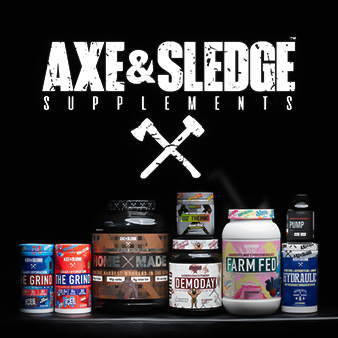Time away from protein is not.
Protein is a nutrient primarily responsible for muscle repair and growth. Protein builds muscle. It’s not rocket science.
What can feel like a confusing equation is figuring out what to be eating, and when to be eating it, to optimize protein consumption throughout your day.
How Much Protein Should I Take?
[/vc_column_text][vc_row_inner equal_height=”yes” content_placement=”middle” column_margin=”default” text_align=”left”][vc_column_inner column_padding=”no-extra-padding” column_padding_position=”all” background_color_opacity=”1″ width=”1/2″ column_border_width=”none” column_border_style=”solid”][vc_column_text]Each individual will have to gauge their protein consumption based off their size, activity level and goals. For example, I am 6-foot-4, 215 pounds, moderately active and have a sedentary job that keeps me at a desk most days. My main goal is to gain muscle. Knowing this, my target daily protein intake is going to be about 215 grams (about .8-1 gram per pound of bodyweight). That is A LOT of protein!For most people, it is recommended to take your body weight and multiply it by .5. That result is the minimum amount in grams of protein you should aim for each day (150 pound person, 75 grams of protein, etc.). You can use protein calculators on various websites and enter your activity levels (sedentary or active job) and goals (fat loss, maintaining, muscle gain) to spit out a target number for you individually. That number should not vary whether you’re on a training day or an off day in the gym.[/vc_column_text][/vc_column_inner][vc_column_inner column_padding=”no-extra-padding” column_padding_position=”all” background_color_opacity=”1″ width=”1/2″ column_border_width=”none” column_border_style=”solid”][image_with_animation image_url=”3430″ alignment=”center” animation=”Fade In” box_shadow=”none” max_width=”100%”][/vc_column_inner][/vc_row_inner][vc_column_text css=”.vc_custom_1509581082771{padding-bottom: 24px !important;padding-left: 40px !important;}”]Here are just some top proteins to include in your diet:
Grass-fed beef – 19 grams protein (3 ounces)
Organic chicken breast – 36 grams (4 ounces)
Black beans – 15 grams (1 cup)
Free-range eggs – 7 grams (1 large egg)
Almonds – 6 grams (1 ounce)
Cottage cheese – 27 grams (1 cup)
Non-fat greek yogurt – 17 grams (6 ounces)[/vc_column_text][vc_column_text css=”.vc_custom_1509581098375{padding-bottom: 24px !important;}”]
When To Consume Protein
Be consistent with your protein packing – even when you’re not pushing weight in the gym.[/vc_column_text][vc_row_inner equal_height=”yes” content_placement=”middle” column_margin=”default” text_align=”left”][vc_column_inner column_padding=”no-extra-padding” column_padding_position=”all” background_color_opacity=”1″ width=”1/2″ column_border_width=”none” column_border_style=”solid”][vc_column_text]Now, the when to consume your protein is another question. It really depends on your body and what type of protein you’re consuming. Whey protein (what many of us put in a protein shake before or after a workout) is absorbed by the body in about 8 grams per hour. Soy protein is closer to 4 grams per hour, while a cooked egg is closer to 3 grams per hour.
The body can only digest and absorb so many grams of protein at a time. The precise amount of what that number is will vary from person to person. Some studies say 30 grams per meal, some say 50 grams, but what is universally accepted as fact: a professional football player and a gymnast are not going to react the same to the same diet. That seems pretty common sense, but there really is not magic formula.[/vc_column_text][/vc_column_inner][vc_column_inner column_padding=”no-extra-padding” column_padding_position=”all” background_color_opacity=”1″ width=”1/2″ column_border_width=”none” column_border_style=”solid”][image_with_animation image_url=”3431″ alignment=”center” animation=”Fade In” box_shadow=”none” max_width=”100%”][/vc_column_inner][/vc_row_inner][vc_row_inner column_margin=”default” text_align=”left”][vc_column_inner column_padding=”no-extra-padding” column_padding_position=”all” background_color_opacity=”1″ width=”1/3″ column_border_width=”none” column_border_style=”solid”][image_with_animation image_url=”3432″ alignment=”center” animation=”Fade In” box_shadow=”none” max_width=”100%”][/vc_column_inner][vc_column_inner column_padding=”no-extra-padding” column_padding_position=”all” background_color_opacity=”1″ width=”2/3″ column_border_width=”none” column_border_style=”solid”][vc_column_text]In general, if building muscles is your goal, spreading your protein intake out among all your meals will be much more effective than trying to get the entire day’s allotment in two huge meals. Altering this plan on training days isn’t necessarily recommended either. Your body likes consistency. The exception to this is your post workout protein powder shake (or protein-heavy meal) on a training day. Make sure to check out our 5 best protein powder picks for 2018.[/vc_column_text][/vc_column_inner][/vc_row_inner][vc_column_text]
Inadequate Protein Consumption
If you’re not eating enough protein, your body (and mind) will probably let you know sooner than you think.
Eating too little protein each day can result in a number of symptoms, including a few obvious ones: trouble building muscle mass, low energy levels and bone or joint pain.
There are studies that also show the following as side effects to protein deficiency:
- Sluggish metabolism
- Trouble losing weight
- Poor concentration and trouble learning
- Moodiness
- Blood sugar changes
- Slow wound healing
- Low immunity
Without an adequate supply of protein, your body won’t support muscle growth properly. You won’t reach your goals. Consumer proper amounts of protein based on your body type and your goal. From protein bars (click here to see our top recommendations) to beef, You will achieve more than you think.[/vc_column_text][/vc_column][/vc_row]







